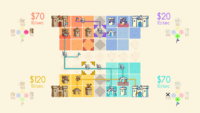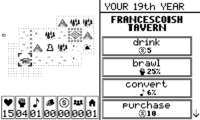Asher Vollmer
Asher Vollmer (born September 14, 1989) is an American indie video game developer and creator of Puzzlejuice and Threes. He created the 2012 iOS game Puzzlejuice while a student at USC Interactive Media & Games Division. The game began his collaboration with Greg Wohlwend. The pair's next release, the 2014 iOS puzzle game Threes, received what review aggregator Metacritic described as "universal acclaim", including perfect scores from Eurogamer and TouchArcade, and the title of Apple Inc.'s iPhone game of the year. The game was later ported to multiple platforms. Polygon included Vollmer in their "50 admirable gaming people" of the year for his work on Threes. Among other projects, Vollmer subsequently worked on Close Castles, a real-time strategy game later put on hiatus, and Royals, a simulation game for OS X and Windows.
Asher Vollmer | |
|---|---|
 | |
| Born | September 14, 1989[1] |
| Occupation | Indie video game developer |
| Known for | Threes! |
Career
Vollmer is a graduate of the USC Interactive Media & Games Division program.[2] As a student, he began work on Puzzlejuice, a puzzle video game. He reached out to artist Greg Wohlwend for aesthetic advice, which led to a collaboration between the two.[3] Puzzlejuice is a combination of Tetris, tile-matching, and Boggle: players rearrange falling tetromino blocks into rows of similar colors, which turn into letters that are cleared from the board by forming words.[4][5] The iOS game was released on January 19, 2012,[6] to what review aggregator Metacritic described as "generally favorable" reviews.[7] Multiple reviewers mentioned the difficulty in mentally balancing the various components of the game.[4][8]
Vollmer started as thatgamecompany's "feel engineer" in August 2012,[9] but left in April 2013 to "go indie" and work on his own projects.[10] On his blog, he said he thought the studio's current project would be groundbreaking, though he was unhappy working there.[11] Vollmer tried to write a short story in an attempt to take a break from games. Before long, he began to play with his computer keyboard. Vollmer challenged himself to make a game that only used the arrow keys, and prototyped what would become Threes in ten hours overnight.[12] He proceeded to iterate on the idea with Wohlwend over the game's 14-month development.[13] In Threes, the player slides numbered tiles on a four-by-four grid[14] to combine addends and multiples of three.[15] Vollmer cited Drop7 as an inspiration for the game, having played it for two years beforehand.[12]
.gif)
Threes had no original inclination towards minimalism.[14] In fact, Vollmer and Wohlwend felt that the game needed to appear more complex so as to interest players.[13] They returned to the original idea and added character personalities to the tiles.[14] The iOS game was released on February 6, 2014,[16] to what Metacritic characterized as "universal acclaim".[17] Reviewers found the game "charming"[18][19][20] and "addictive",[15][19][20][21][22][23] and compared it to Drop7 (2009),[22] Triple Town (2010),[18][22][24] and Stickets (2013).[18][22] Eurogamer[22] and TouchArcade awarded the game perfect scores, with the latter calling Threes "about as close as it gets to a perfect mobile game".[25] Other developers released similar games and clones within weeks of the game's launch.[26] Apple named Threes its best iPhone game of 2014.[27] The game was later ported to Android, Xbox One,[28] and Windows Phone platforms.[29] Polygon included Vollmer in their "50 admirable gaming people of 2014" for his work on Threes.[30]
Vollmer thought he would work on a new game a month after releasing Threes, but was kept busy by obligations to fix and update the game, to port it to other platforms, and to promote game through press and events. He was convinced that he would never make a game "as clean and tight as Threes ever again".[31] Vollmer's next game was Close Castles, a real-time strategy game.[31]
After Threes


Vollmer unveiled Close Castles in June 2014. Players start in corners of a "grid map" and are represented by castles.[32] Vollmer explained that the game's name is from castles built too close to one another, starting a mutually assured destruction scenario. Players can build three structure types out from their castle: towers that fire at incoming enemies (defense), houses that make "loyal subjects" (offense), and markets that make money (economy).[32] The "A" button with a direction constructs a path directing followers to the enemy. Followers capture enemy structures as denoted by a "defense bar" that fills as followers enter the structure and that destroys the structure when filled.[32] Markets are the weakest structure, and two towers can defend against one house. Player turf grows as player structures approach the limits of their area. Players earn five units of money a second, which increases by five for every market. Polygon called the game's simple visual design "horrifyingly deceptive".[32] Vollmer has said that games should last around three minutes apiece and that the local multiplayer's lack of "hidden information" should make interactions with other players less of a "sadomasochistic" game of waiting for an opponent to concede.[33] The game was demoed on an Xbox 360[32] but was planned for release on the PlayStation 4.[33] Vollmer put the project on hold while he worked out "fundamental flaws" in the gameplay.[31]
While Vollmer traditionally worked on multiple games at once, Close Castles was his only project when it was in production. In March 2015, he worked three days a week on a bigger project with a small team, and saved his other days for personal experimentation and Threes bugs.[31] The next month, Vollmer released Royals, a pay what you want simulation game for OS X and Windows. The player controls a peasant who advances towards royal status by collecting resources and followers. Every player decision counts as a year of the peasant's life. Polygon's Megan Farokhmanesh described the game as difficult and charming, with a "quirky, subtle humor".[34] The game was designed to be "purposefully difficult and obtuse" and "nothing like Threes".[35] Eurogamer's Jeffrey Matulef wrote that the gameplay was like a "comically minimalist roguelike" for its emphasis on resource management and short player lifespans.[35]
In February 2016, Vollmer announced Guildlings, a fantasy adventure game from a new studio he had founded with other indie developers the previous year, Sirvo Studios.[36] They received funding from FunPlus, who also started a $50 million investment fund for the early projects of rising video game developers and artists.[37] The game released in November 2019.[38]
References
- Vollmer, Asher (May 17, 2015). "@czarwp 09/14/89 !". Twitter. Archived from the original on July 6, 2019. Retrieved May 17, 2015.
- "TRACY FULLERTON NAMED DIRECTOR OF USC GAMES". USC Games. May 20, 2014. Archived from the original on January 23, 2014. Retrieved June 13, 2014.
- Wohlwend, Greg (February 9, 2012). "365 PUZZLEJUICE EMAILS [PT.1]". aeiowu. Archived from the original on May 10, 2012. Retrieved June 13, 2014.
- "Puzzlejuice review". Edge. January 25, 2012. Archived from the original on July 14, 2014. Retrieved June 12, 2014.
- Woodfield, Troy (January 20, 2012). "'Puzzlejuice' Review - A Mashup of Tetris, Match-3 and Boggle". TouchArcade. Retrieved June 12, 2014.
- Fletcher, JC (January 18, 2012). "Puzzlejuice summoned to App Store tomorrow". Joystiq. Archived from the original on July 14, 2014. Retrieved June 13, 2014.
- "Puzzlejuice Critic Reviews for iPhone/iPad". Metacritic. Archived from the original on December 3, 2015. Retrieved June 12, 2014.
- Brown, Mark (January 25, 2012). "PuzzleJuice Review for iPhone". VideoGamer.com. Archived from the original on September 5, 2015. Retrieved June 12, 2014.
- Kubba, Sinan (August 28, 2012). "Puzzlejuice desktop debuting at PAX, coming to Steam Greenlight". Joystiq. Archived from the original on January 28, 2015. Retrieved June 13, 2014.
- Hillier, Brenna (April 9, 2013). "Thatgamecompany veteran says indie's next game will "change the industry"". VG247. Archived from the original on May 24, 2013. Retrieved June 13, 2014.
- Long, Neil (April 8, 2013). "Thatgamecompany's next game will change the industry, says departing game designer". Edge. Archived from the original on February 23, 2014. Retrieved June 13, 2014.
- Narcisse, Evan (February 14, 2014). "'A Game You Can Play Forever'". Kotaku. Archived from the original on June 10, 2014. Retrieved June 13, 2014.
- Johnson, Eric (February 21, 2014). "Hit iOS Puzzle Game Threes Almost Had Monsters and Sushi". Re/code. Archived from the original on March 2, 2014. Retrieved March 20, 2014.
- Kuchera, Ben (February 6, 2014). "Why it took a year to make, and then break down, an amazing puzzle game". Polygon. Archived from the original on February 9, 2014. Retrieved February 22, 2014.
- Webster, Andrew (February 6, 2014). "By the numbers: 'Threes' is your new iPhone addiction". The Verge. Archived from the original on March 1, 2014. Retrieved March 20, 2014.
- "Threes! Overview". Polygon. Archived from the original on March 11, 2014. Retrieved March 20, 2014.
- "Threes! Critic Reviews for iPhone/iPad". Metacritic. Archived from the original on March 9, 2014. Retrieved March 30, 2014.
- "Threes review". Edge. February 10, 2014. Archived from the original on March 2, 2014. Retrieved February 22, 2014.
- Nichols, Scott (February 11, 2014). "Mobile reviews: Threes, Eliss Infinity, Toad Rider". Digital Spy. Archived from the original on January 2, 2015. Retrieved February 22, 2014.
- Polson, John (February 8, 2014). "iOS Pick: Threes (Sirvo)". IndieGames.com. Archived from the original on March 2, 2014. Retrieved March 20, 2014.
- Parker, Jason; Mitroff, Sarah (February 7, 2014). "Threes Review". CNET. Archived from the original on March 2, 2014. Retrieved March 20, 2014.
- Sorrell, Mark (March 5, 2014). "Threes! review". Eurogamer. Archived from the original on March 7, 2014. Retrieved March 19, 2014.
- Bilton, Nick (February 17, 2014). "Threes, a New Addictive Puzzle Game". The New York Times. Archived from the original on March 20, 2014. Retrieved March 20, 2014.
- Brown, Mark (March 14, 2014). "Threes! review - iPhone reviews". Pocket Gamer. Archived from the original on March 17, 2014. Retrieved March 20, 2014.
- Hodapp, Eli (February 6, 2014). "'Threes!' Review - Checking the Boxes of a Perfect Mobile Game". TouchArcade. Archived from the original on February 7, 2014. Retrieved February 22, 2014.
- Leibl, Matt (February 19, 2014). "You can now play Threes from your PC browser". GameZone. Archived from the original on March 6, 2014. Retrieved March 20, 2014.
- Dredge, Stuart (December 8, 2014). "Apple's best apps of 2014: Replay, Pixelmator, Threes! and Monument Valley". The Guardian. Archived from the original on December 8, 2014. Retrieved December 8, 2014.
- Sarkar, Samit (December 3, 2014). "Threes! and Limbo launching Dec. 5 on Xbox One". Polygon. Archived from the original on December 18, 2014. Retrieved December 3, 2014.
- Thorp-Lancaster, Dan (April 27, 2015). "Threes! makes its Windows Phone debut for the low, low price of free". Windows Central. Mobile Nations. Archived from the original on April 29, 2015. Retrieved April 30, 2015.
- Campbell, Colin (December 30, 2014). "Polygon's 50 admirable gaming people of 2014". Polygon. Archived from the original on December 31, 2014. Retrieved December 30, 2014.
- Webster, Andrew (March 26, 2015). "After a hit game, indie developers struggle to replicate success". The Verge. Archived from the original on April 28, 2015. Retrieved April 30, 2015.
- Pitcher, Jenna (June 14, 2014). "Threes! developer has a new game. Don't read this". Polygon. Archived from the original on June 17, 2014. Retrieved June 14, 2014.
- Farokhmanesh, Megan (December 1, 2014). "Threes dev wants to make strategy games less sadomasochistic". Polygon. Archived from the original on December 3, 2014. Retrieved December 1, 2014.
- Farokhmanesh, Megan (April 30, 2015). "We'll never be royals in this new peasant simulator from the creator of Threes". Polygon. Archived from the original on May 3, 2015. Retrieved May 1, 2015.
- Matulef, Jeffrey (April 30, 2015). "Threes developer releases 'optimistic peasant simulator' Royals". Eurogamer. Archived from the original on May 3, 2015. Retrieved May 1, 2015.
- http://www.gamasutra.com/view/news/265943/Threes_dev_forms_new_studio_announces_first_game.php
- http://www.polygon.com/2016/2/24/11104668/guildings-threes-interview
- Webster, Andrew (November 8, 2019). "Apple Arcade's latest surprise is Guildlings, a cute fantasy game from the creator of Threes and The Misadventures of PB Winterbottom". The Verge. Retrieved November 9, 2019.